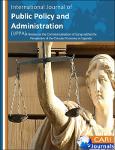A Review on the Commercialisation of Scrap within the Perspective of the Circular Economy in Uganda
Abstract
Purpose: This study aimed to review commercialisation of scrap with a view of stimulating the circular economy of Uganda.
Methodology: A desk review method was adopted seeing that the researchers did not have any funds devoted to this research coupled with limited time as a result of busy work schedules. This method is handy in unearthing important issues using secondary data such as academic journals, text books, periodic reports, policy documents and other official documents of government and non-state actors such as the civil society.
Findings: The circular economy in Uganda offers opportunities for the reuse of materials, job creation, waste reduction, and resource preservation, but challenges such as inadequate infrastructure, the informal sector, health and safety risks, limited access to raw materials, insufficient financing, and a lack of regulation and enforcement need to be addressed. Solutions to promote a safer and more sustainable circular economy include reducing waste at the source, promoting reuse and repair, and designing products for circularity. A multi-stakeholder approach that involves collaboration and partnerships between the government, private sector, and communities is needed.
Unique Contribution to Theory, Practice and Policy: This review acts as an eye opener to the urban authorities in uganda and the region seeing that commercialisation of scrap serves as a form of employment for several youths, generates revenues and more importantly helps to mitigate climate change variability on top of maintaining cleaner cities and towns.
Collections
- Research Articles [143]

